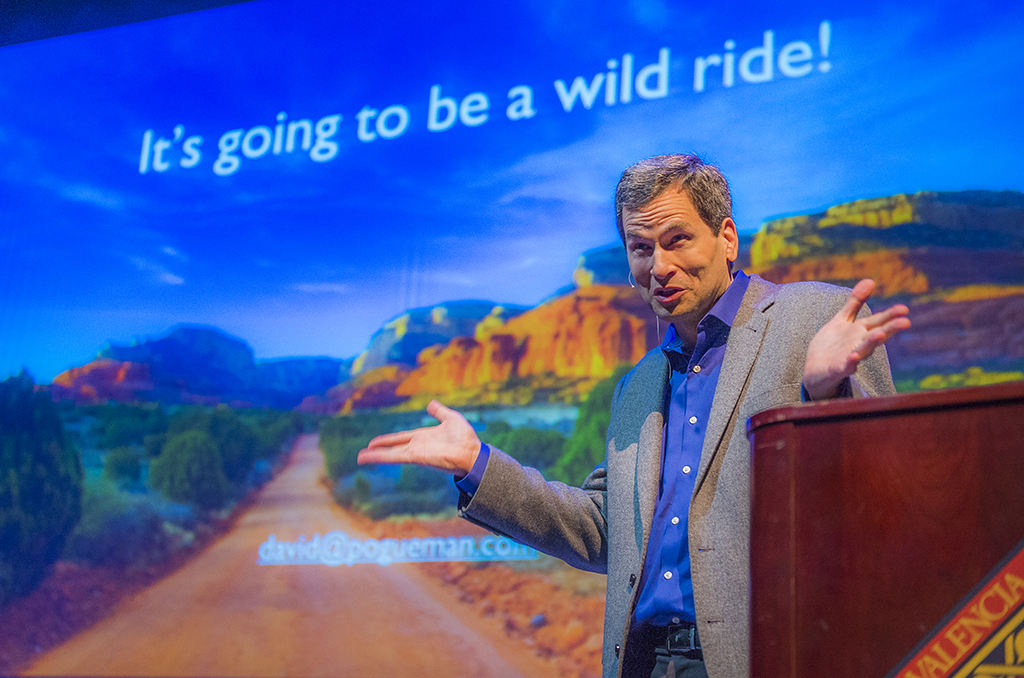David Pogue loves to sing the praises of technology — and the former Broadway composer can play a mean piano too.
Americans are at the dawn of a new technological age, but it’s difficult to predict where technology is heading, says Pogue, the former New York Times columnist who currently writes about technology and gadgets for Yahoo! and stars in NOVA Science Now specials on PBS. He visited Valencia on March 25 and 26, speaking at East and West campus.
While Pogue’s job requires him to test the latest and greatest gadgets, he focuses on their function. He wants to determine if they make sense — and what impact they’ll have on our lives.
“It’s not just about the gadgets,” says Pogue. “It’s the effect of the gadgets on society.”
For instance, he notes that not all technology is immediately embraced. For instance, Google Glass has not been met with enthusiasm everywhere. The glasses — which enable users to film and photograph what they’re looking at — have been banned in theaters, movies and courthouses because it’s so easy for users to videotape people and events surreptitiously. “They have a social problem,” says Pogue, who says that Google Glass wearers are now sometimes called “Glassholes.”
Conversely, while people aren’t wild about Google Glass, they seem enamored by robots and self-driving cars. And even consumer drones — which can be used for aerial photography and for some very useful applications, such as inspecting skyscrapers, bridges and roofs without asking someone to climb there.
Yet the rate of innovation and change today is mind-boggling. “There have always been generation gaps, but I think the change in the last five years has created a bigger shift than ever before,” Pogue said.
Today’s college students are less likely to use email and voicemail — innovations that seem current to their parents’ generation — than to use texting and Twitter. Those services allow them to immediately connect with one another.
Indeed, one employer told him that because college graduates do not have home phones — and many have never used one — that the company’s standard employee orientation includes a demonstration on how to use a desk phone.
And, the gap between the generations grows even wider when it comes to privacy concerns. Most millennials don’t mind sharing their anonymous information in exchange for something useful — such as real-time traffic reprots, which are culled from tracking the location of millions of Android phones. Similarly, when Google offered Gmail free with a lot of storage space, many young people quickly adopted it, unbothered by the notion that Google was using a computer to scan the content of emails and sell advertising targeted to the writer.
While that notion doesn’t bother most young people, Pogue discovered that their parents and grandparents were alarmed by that use of their emails. “Let me tell you: the oldsters were freaking out,” Pogue said.
Yet Pogue says that there are some real benefits that come from sharing so much information. Fitness bands — high-tech arm bands that record how many steps you take, tally the miles you travel, calculate the calories you burn and read your heart rate — record not just daily activities, but sleep patterns too. And by taking hundreds of thousands of people’s sleep patterns, it has given scientists good data for sleep studies.
The most ubiquitous — and life-changing — piece of technology in the American arsenal today is the smartphone. Far from being just a phone, the smartphone allows millions of Americans to carry a small computer — one that can be used many ways, thanks to the millions of apps being developed. From the ocarina app that allows people to play music on their phone as by blowing into it like an Ocarina, to the app that allows them to program their home’s thermostat remotely, smartphones are changing our lives.
“We are just at the beginning of this amazing technology,” says Pogue. And ideas that people were dreaming of only a few years ago are now available. For instance, there’s now an app called Twittaround that allows smartphone users to hold up their phone, scan the room and see who’s on Twitter nearby. Likewise, another app, TAT, uses facial recognition software to identify people — and it provides their social media information. That, Pogue noted, would be pretty useful at a party. Already, services like iZon allow you to monitor your home security via your smartphone. And the app Word Lens instantly translates printed words in one language into another using the phone’s built-in video camera.
“This — the current smartphone — is the Model T of technology,” said Pogue. “We’re just at the dawn of this.”
